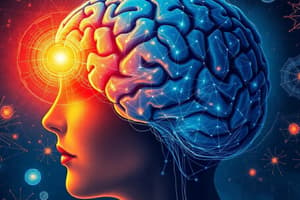Podcast
Questions and Answers
What is the primary argument of Edward Thorndike's theory of intelligence?
What is the primary argument of Edward Thorndike's theory of intelligence?
- Intelligence comprises multiple, distinct abilities. (correct)
- Intelligence is a singular, general ability.
- Intelligence depends on abstract reasoning alone.
- Intelligence is solely determined by social skills.
Which type of intelligence, according to Thorndike, is essential for interpreting social cues and building relationships?
Which type of intelligence, according to Thorndike, is essential for interpreting social cues and building relationships?
- Social intelligence (correct)
- Emotional intelligence
- Concrete intelligence
- Abstract intelligence
Concrete intelligence is primarily associated with which of the following abilities?
Concrete intelligence is primarily associated with which of the following abilities?
- Manipulating physical objects (correct)
- Understanding theoretical concepts
- Performing abstract reasoning
- Interpreting social behavior
Which aspect of intelligence does abstract intelligence emphasize?
Which aspect of intelligence does abstract intelligence emphasize?
Edward Thorndike's theory differs from Charles Spearman's view on intelligence in that Thorndike emphasizes what?
Edward Thorndike's theory differs from Charles Spearman's view on intelligence in that Thorndike emphasizes what?
Which of the following statements is NOT true regarding Thorndike's types of intelligence?
Which of the following statements is NOT true regarding Thorndike's types of intelligence?
What is a cornerstone of social intelligence as described by Thorndike?
What is a cornerstone of social intelligence as described by Thorndike?
Which type of intelligence would be most relevant for someone engaged in craftsmanship?
Which type of intelligence would be most relevant for someone engaged in craftsmanship?
What are the two primary types of intelligence identified in Cattell's theory?
What are the two primary types of intelligence identified in Cattell's theory?
How did Alfred Binet define intelligence?
How did Alfred Binet define intelligence?
How does fluid intelligence (Gf) change with age?
How does fluid intelligence (Gf) change with age?
What was one of Binet's key contributions to the study of intelligence?
What was one of Binet's key contributions to the study of intelligence?
What does crystallized intelligence (Gc) encompass?
What does crystallized intelligence (Gc) encompass?
According to Charles Spearman's two-factor theory, what does 'g' represent?
According to Charles Spearman's two-factor theory, what does 'g' represent?
What was a significant advancement Cattell made to Spearman's concept of intelligence?
What was a significant advancement Cattell made to Spearman's concept of intelligence?
What are 's' factors according to Spearman's theory of intelligence?
What are 's' factors according to Spearman's theory of intelligence?
Which framework built upon Cattell's theory to integrate multiple intelligence factors?
Which framework built upon Cattell's theory to integrate multiple intelligence factors?
Which of the following statements best reflects Binet's view on intelligence?
Which of the following statements best reflects Binet's view on intelligence?
Which of the following best represents fluid intelligence?
Which of the following best represents fluid intelligence?
What did Spearman believe about the relationship between 'g' and 's' factors?
What did Spearman believe about the relationship between 'g' and 's' factors?
Which statement about crystallized intelligence is accurate?
Which statement about crystallized intelligence is accurate?
What role does learned knowledge play in Cattell’s view of intelligence?
What role does learned knowledge play in Cattell’s view of intelligence?
What aspect of intelligence did Binet emphasize in his work?
What aspect of intelligence did Binet emphasize in his work?
What misconception about intelligence does Binet's work challenge?
What misconception about intelligence does Binet's work challenge?
Flashcards
Multiple Intelligences
Multiple Intelligences
The idea that intelligence is not a single, general ability but a collection of distinct skills, each serving a specific purpose.
Thorndike's Theory of Intelligence
Thorndike's Theory of Intelligence
A theory that posits intelligence comprises three key types: social, concrete, and abstract intelligence.
Social Intelligence
Social Intelligence
The ability to understand, interact with, and relate effectively to others. It involves interpreting social cues, fostering communication, and building meaningful relationships.
Concrete Intelligence
Concrete Intelligence
Signup and view all the flashcards
Abstract Intelligence
Abstract Intelligence
Signup and view all the flashcards
General Intelligence (g)
General Intelligence (g)
Signup and view all the flashcards
Spearman's Two-Factor Theory
Spearman's Two-Factor Theory
Signup and view all the flashcards
The Nature of Intelligence Debate
The Nature of Intelligence Debate
Signup and view all the flashcards
Fluid Intelligence (Gf)
Fluid Intelligence (Gf)
Signup and view all the flashcards
Crystallized Intelligence (Gc)
Crystallized Intelligence (Gc)
Signup and view all the flashcards
Cattell's Theory of Intelligence
Cattell's Theory of Intelligence
Signup and view all the flashcards
How Fluid and Crystallized Intelligence Change Over Time
How Fluid and Crystallized Intelligence Change Over Time
Signup and view all the flashcards
Nature and Nurture in Intelligence
Nature and Nurture in Intelligence
Signup and view all the flashcards
Cattell-Horn-Carroll (CHC) Theory
Cattell-Horn-Carroll (CHC) Theory
Signup and view all the flashcards
What is fluid intelligence (Gf)?
What is fluid intelligence (Gf)?
Signup and view all the flashcards
What is crystallized intelligence (Gc)?
What is crystallized intelligence (Gc)?
Signup and view all the flashcards
What was Binet's view of intelligence?
What was Binet's view of intelligence?
Signup and view all the flashcards
What is the 'g' factor according to Spearman's theory?
What is the 'g' factor according to Spearman's theory?
Signup and view all the flashcards
How do 'g' and 's' factors relate in Spearman's theory?
How do 'g' and 's' factors relate in Spearman's theory?
Signup and view all the flashcards
What was the significance of Spearman's work?
What was the significance of Spearman's work?
Signup and view all the flashcards
What was Binet's focus in defining intelligence?
What was Binet's focus in defining intelligence?
Signup and view all the flashcards
What was unique about Binet's perspective on intelligence?
What was unique about Binet's perspective on intelligence?
Signup and view all the flashcards
How did Spearman's theory of intelligence impact our understanding?
How did Spearman's theory of intelligence impact our understanding?
Signup and view all the flashcards
How do Binet and Spearman's views on intelligence compare?
How do Binet and Spearman's views on intelligence compare?
Signup and view all the flashcards
Study Notes
Definitions of Intelligence
- Alfred Binet defined intelligence as the ability to judge well, reason effectively, and understand deeply. It's a practical and dynamic ability to adapt to challenges.
- Binet's intelligence tests weren't designed to label individuals but to identify children needing extra support, recognizing intelligence grows with learning.
- Binet focused on how intelligence is applied in everyday life, emphasizing the ability to solve real-world problems.
Charles Spearman
- Spearman viewed intelligence as a combination of general intelligence ("g") and specific abilities ("s").
- "g" represents broader cognitive capacity, encompassing adaptability and problem-solving across intellectual tasks.
- "s" factors represent specific skills, varying with tasks, like mathematical ability or verbal fluency.
- Spearman's theory highlights intelligence as more than task-specific, stemming from a universal cognitive capacity.
Louis Thurstone
- Thurstone challenged the concept of a single intelligence factor, proposing multiple "primary mental abilities," instead.
- These independent abilities include verbal comprehension, numerical ability, spatial visualization, memory, reasoning, word fluency, and perceptual speed.
- Thurstone's theory emphasizes the diverse nature of intellectual abilities and individual strengths.
Jean Piaget
- Piaget viewed intelligence as a dynamic and adaptive process evolving through interaction with the environment.
- Intelligence progresses through specific developmental stages: sensorimotor, preoperational, concrete operational, and formal operational.
- Intelligence develops through assimilation, which incorporates new information into existing frameworks, and accommodation, which modifies these frameworks.
David Wechsler
- Wechsler defined intelligence as the global capacity to act purposefully, think rationally, and cope effectively with the environment.
- Wechsler's approach emphasizes the functional and adaptive aspects of intelligence.
- Wechsler emphasized the potential importance of intelligence and believed it's about growth and potential.
Howard Gardner
- Gardner proposed the Theory of Multiple Intelligences, recognizing distinct types of intelligence, not a single ability.
- These intelligences include linguistic, logical-mathematical, musical, spatial, bodily-kinesthetic, interpersonal, intrapersonal, and naturalistic intelligence.
- Gardner suggests intelligences operate independently but can combine to form an individual's strengths.
Robert Sternberg
- Sternberg's Triarchic Theory of Intelligence introduced three components: analytical, creative, and practical intelligence.
- Analytical intelligence involves problem-solving, logical reasoning, and comparing information.
- Creative intelligence involves using imagination and innovation to generate unique ideas.
- Practical intelligence highlights the ability to adapt to everyday real-world challenges.
Raymond Cattell
- Cattell's theory of intelligence comprised fluid and crystallized intelligence.
- Fluid intelligence is the ability to solve novel problems logically in unfamiliar situations.
- Crystallized intelligence represents learned knowledge (vocabulary and general information).
Studying That Suits You
Use AI to generate personalized quizzes and flashcards to suit your learning preferences.




